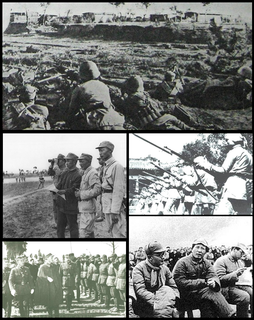Linfen Campaign (临汾战役) was a series of battles fought between the communists and the nationalists during the Chinese Civil War to control the city of Linfen, and resulted in the communist victory.
The Linfen–Fushan Campaign (临浮战役) was a series battles fought in regions between Linfen and Floating Mountain in Shanxi, China between the nationalists and the communists during the Chinese Civil War and resulted in communist victory.
Campaign to the North of Baoding consisted of several battles fought between the Nationalists and the Communists in the region north of Baoding during the Chinese Civil War in the post-World War II era and resulted in a Communist victory.
The Yanzhou Campaign, also known as the Campaign at the Central Section of the Tianjin-Pukou Railway was a series of battles fought between the nationalists and the communists for the control of the town Yanzhou (兖州), which is today under the administration of Jining, and the region to the north of the town in Shandong, China during the Chinese Civil War in the post World War II era, and resulted in communist victory.
The Hebei – Rehe – Chahar Campaign (冀热察战役) was a series of battles fought in Northern China between the nationalists and the communists during the Chinese Civil War in the post World War II era, and resulted in communist victory.
Datong-Jining Campaign (大同集宁战役) was a series of battles fought between the nationalists and the communists mainly in northern Shanxi and the surrounding regions during the Chinese Civil War in the post-World War II era. The main battlefield was centered on two cities, Datong and Jining.
The Campaign to the North of Daqing River was a series of battles fought between the nationalists and the communists in Hebei, China during the Chinese Civil War in the post-World War II era.
The Battle of Dalushan Islands (大鹿山等岛战斗) was a battle fought between the nationalists and the communists for several islands and islets just off the coast of Zhejiang, China during aftermath of the Chinese Civil War in the post-World War II era; it resulted in a communist victory.
The Battle of Niangziguan was a battle fought between the communists and the nationalists during the Chinese Civil War in the post World War II era and resulted in communist victory. The battle was a critical one in Zhengtai Campaign that helped to determine the outcome of the campaign.
The Battle of Rugao-Huangqiao was a battle fought between the communists and the nationalists during the Chinese Civil War in the post World War II era and resulted in communist victory. The battle was a one seven major battles in Central Jiangsu Campaign.
The Battle of Tianquan was a battle fought between the communists and the nationalists during the Chinese Civil War in the post World War II era and resulted in communist victory. It is also called "The Battle to Defend Tianquan" by the communists.
The Battle of Bamianshan (八面山战斗) was a battle fought between the Nationalists and the Communists during the Chinese Civil War in the post-World War II era and resulted in communist victory.
Campaign to Suppress Bandits in Liuwandashan was a counter-guerrilla / counterinsurgency campaign the communists fought against the nationalist guerrilla that was mostly consisted of bandits and nationalist regular troops left behind after the nationalist regime withdrew from mainland China. The campaign was fought during the Chinese Civil War in the post-World War II era in the region of Liuwandashan in Guangxi and resulted in communist victory. This campaign is part of Campaign to Suppress Bandits in Guangxi, which in turn, was part of Campaign to Suppress Bandits in Central and Southern China.
The Campaign to Suppress Bandits in Shiwandashan was a counter-guerrilla / counterinsurgency campaign the communists fought against the Kuomintang guerrilla left behind after the nationalist regime withdrew from mainland China. The campaign was fought during the Chinese Civil War in the post-World War II era in the region of Shiwandashan in Guangxi at the China-Vietnam border and resulted in communist victory. This campaign is part of Campaign to Suppress Bandits in Guangxi, which in turn, was part of Campaign to Suppress Bandits in Central and Southern China.
The Weixian–Guangling–Nuanquan Campaign (蔚广暖战役) was a campaign fought in Wei (蔚) County and Warm Spring of Chahar (province) and Guanling (广灵) of Shanxi, and it was a clash between the communists and the former nationalists turned Japanese puppet regime force who rejoined the nationalists after World War II. The battle was one of the Chinese Civil War in the immediate post World War II era, and resulted in communist victory. This campaign was part of the General Counteroffensive in Shanxi-Chahar (province)-Hebei.
Campaign to Suppress Nationalists in Northeastern Guizhou (黔东北剿匪) was a counter-guerrilla / counterinsurgency campaign the communists fought against the nationalist guerrilla that was mostly consisted of bandits and nationalist regular troops left behind after the nationalist regime withdrew from mainland China. The campaign was part of the Chinese Civil War in the post-World War II era fought in northeastern Guizhou, and resulted in communist victory. This campaign is a major part of Campaign to Suppress Bandits in Southwestern China during the Chinese Civil War in the post-World War II era.
Campaign to Suppress Bandits in the border region of the Hubei-Hunan-Sichuan (湘鄂川边剿匪) was a counter-guerrilla / counterinsurgency campaign the communists fought against the Kuomintang guerrilla left behind after the nationalist government withdrew from mainland China. The campaign was actually fought after the Chinese Civil War was declared over by the PRC in Beijing a year earlier, and took place in the border regions of the following three Chinese provinces: Hubei, Hunan, and Sichuan, and resulted in communist victory. This campaign was part of Campaign to Suppress Bandits in Central and Southern China.
Campaign to Suppress Bandits in Western Hunan was a counter-guerrilla / counterinsurgency campaign the communists fought against the Kuomintang guerrilla left behind after the nationalist regime withdrew from mainland China. The campaign was fought during the Chinese Civil War in the post-World War II era in western Hunan Province, and resulted in a PLA victory. This campaign was part of Campaign to Suppress Bandits in Central and Southern China.
Battle of Shangcai was a series of clashes fought between the nationalists and the communists during Chinese Civil War in the post World War II era, and resulted in the communist victory. The battle is also called the Blocking Actions at Shangcai (上蔡阻击战) by the communists, who launched the battle to support their Eastern Hennan Campaign, with intention to prevent the nationalist force from reinforce their comrades-in-arms fighting the Eastern Hennan Campaign.
The Battle of Tang'erli (堂二里战斗) was a series of armed conflicts fought between the nationalists and the communists during Chinese Civil War in the post World War II era, and resulted in the communist victory.

Beijing, formerly romanized as Peking, is the capital of the People's Republic of China, the world's third most populous city proper, and most populous capital city. The city, located in northern China, is governed as a municipality under the direct administration of central government with 16 urban, suburban, and rural districts. Beijing Municipality is surrounded by Hebei Province with the exception of neighboring Tianjin Municipality to the southeast; together the three divisions form the Jingjinji metropolitan region and the national capital region of China.

The International Standard Book Number (ISBN) is a numeric commercial book identifier which is intended to be unique. Publishers purchase ISBNs from an affiliate of the International ISBN Agency.








